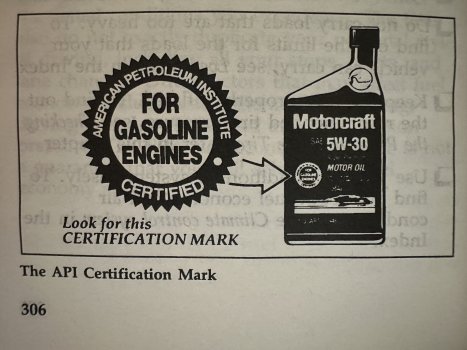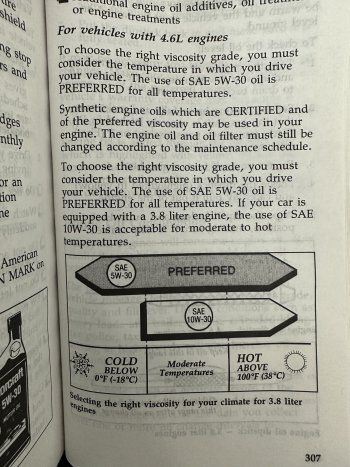- Joined
- Sep 12, 2023
- Messages
- 2,041
- Location
- North Ridgeville, OH
- Cars in Garage
- 2
- Vehicle Details
- 1997 Thunderbird 4.6, 1998 Mark VIII LSC
This has been beaten to death elsewhere, but here it's still a new topic! 
I've been using Valvoline's full synthetic with high mileage additives in the cars for a good while - changing with an FL-820s filter every 5000 miles. I just noticed a new "higher" mileage formula in a black bottle - 150k+ miles instead of 75k+. However it's a synthetic blend instead of a full synthetic, which gives me pause... but I was thinking I'd give it a try anyway. The Mark VIII loses about 1.5 quarts between changes and I wonder if the extra seal conditioners might do the old engine some good. I've never been much on the various "cure all" additives that come in pint-sized bottles.
As to weight, I've been using the originally spec'd 5W30. I know in 2001 Ford declared that all 4.6s were to use 5W20. I used it a few times and don't recall noticing much difference. Supposedly it was to improve mileage slightly to help with CAFE standards, and some others claim it helps with getting pressure to the heads on cold starts. Wasn't sure what the consensus was here on that, so I figured I'd ask.
At one point on TSTSNBN, someone suggested that I try 0W20 in the 4v motor on my 96 to reduce startup valvetrain noise. I tried that... then the engine spun a rod bearing 400 miles later.

I've been using Valvoline's full synthetic with high mileage additives in the cars for a good while - changing with an FL-820s filter every 5000 miles. I just noticed a new "higher" mileage formula in a black bottle - 150k+ miles instead of 75k+. However it's a synthetic blend instead of a full synthetic, which gives me pause... but I was thinking I'd give it a try anyway. The Mark VIII loses about 1.5 quarts between changes and I wonder if the extra seal conditioners might do the old engine some good. I've never been much on the various "cure all" additives that come in pint-sized bottles.
As to weight, I've been using the originally spec'd 5W30. I know in 2001 Ford declared that all 4.6s were to use 5W20. I used it a few times and don't recall noticing much difference. Supposedly it was to improve mileage slightly to help with CAFE standards, and some others claim it helps with getting pressure to the heads on cold starts. Wasn't sure what the consensus was here on that, so I figured I'd ask.
At one point on TSTSNBN, someone suggested that I try 0W20 in the 4v motor on my 96 to reduce startup valvetrain noise. I tried that... then the engine spun a rod bearing 400 miles later.





